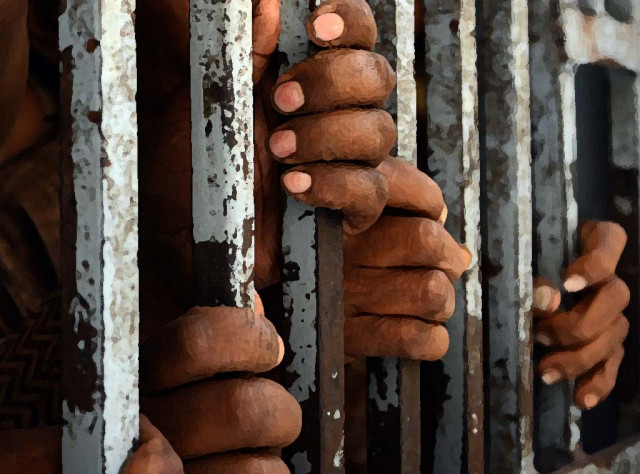From behind bars: 250 inmates of Karachi jail to vote
Superintendent nearly misses registration date; only a fraction of prisoners are registered.

PHOTO: AFP/ FILE
For some prisoners of the Karachi Central Jail, a chance to cast their votes almost slipped away if it had not occurred to the facility’s senior superintendent that Thursday was the last day to register for postal ballot papers - the only way inmates can vote.
And when the officials at the jail finally realised the deadline, it was too late for most inmates - only 250 of the nearly 4,000 prisoners at the jail had their CNICs on them and will be casting their votes through postal ballot papers. Just hours before the deadline, the newly-appointed senior superintendent Kazi Nazir Ahmed complained how the election commission didn’t inform him well in advance about how prisoners were to vote. “They didn’t even send us the application forms.”
He rang up Muhammad Najeeb, the provincial director of the election commission, but this proved to be futile. “We had informed everyone and have completed all our procedures,” a stern Najeeb told him before hanging up.

The superintendent, realising that it was the last day to apply for the postal ballot, scrambled to get hold of an application form and told one of his inspectors to make fifty photocopies of the document. He then frantically sifted through newspapers until he found what he was looking for: the number on which people must send text messages to find out the area where they have been registered.
Ahmed then jotted the number on a piece of paper and then handed it over to another officer. “Use your phone to text prisoners’ ID numbers to find out where they have been registered. Just go,” he instructed the officer, adding that only one-fourth of the prisoners have identity cards on them.
He asked another officer to find out which prisoners possessed identity cards and get them to fill the application form. “Don’t leave the office till this work is done. We have to submit all forms today.” The officers promptly rushed back to the barracks, hitting the cells housing the political activists first.
As the sun sank below the horizon, the officers completed the list - around 250 prisoners, mostly political activists, had filled the application forms which were dispatched to the election commission.
This is one of the rare occassions that prisoners will cast their votes. They did so during the referrendums held by Generals Ziaul Haq and General Pervez Musharraf Nazeer Shah, the superintendent of the Malir jail said that no prisoner detained there would be voting. There are 2,500 prisoners in the jail.
Voting from a distance
The first inmate to fill out the application form was Muhammad Saleem Khan, who claims to be the head of all Pakistan Peoples Party (PPP) activists in jail.

Activists from different political parties are housed in separate barracks. He said that 55 PPP activists live in two barracks. “I’m so happy that I’ll be casting my vote. In the last elections, I was quite disappointed that I couldn’t do so as nobody asked us to fill out application forms,” said Khan, who has been in jail for the past 13 years. He was charged with murder and sentenced to life in prison.
The 45-year-old man claimed he joined PPP in 1988 and remains a loyalist. Though he and his fellow inmates are unhappy the party did nothing for them in the last tenure, they’ll still vote for it.
A voter and activist of another party who wished to remain anonymous, said the current violence around election days reminded him of how things had been in the past. “It was hard to campaign back then as well. I was shot twice. And now watching news of blasts and attacks reminds me of those days and makes me upset.”
How prisoners vote
Prisoners across the country can vote through postal ballot - a process where a voter casts his vote through post.
Only government servants, members of armed forces, police, polling officers and prisoners who are unable to come to the polling station on the voting day may use this facility. According to the election commission’s rules and regulations on its website, people who wish to vote this way must submit an application form to the returning officer of his or her constituency. The form can be obtained from returning officers and should be stamped by officials before they are submitted. There are separate application forms for National Assembly and provincial assembly seats.
If the application is accepted, the returning officer mails back ballot paper and two envelopes.
Unlike other people who go to polling stations and vote by thumb impression, those who choose postal ballots write down the name of their choice on the form. The ballot paper has to be attached to a signed declaration form. Both documents are then dispatched to the returning officer of the voter’s constituency.
Published in The Express Tribune, April 26th, 2013.



















COMMENTS
Comments are moderated and generally will be posted if they are on-topic and not abusive.
For more information, please see our Comments FAQ